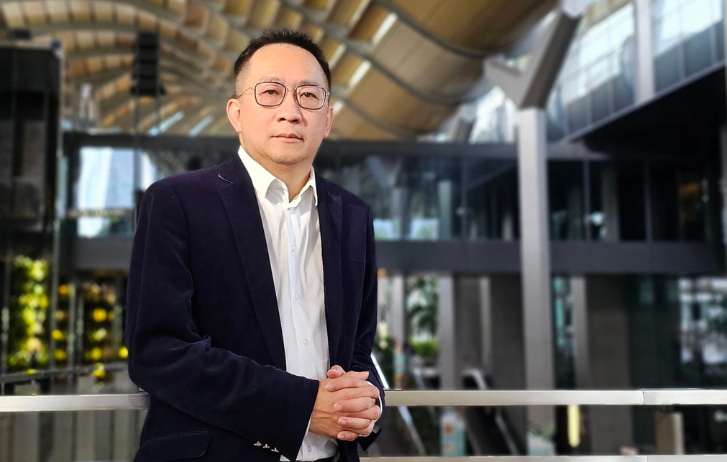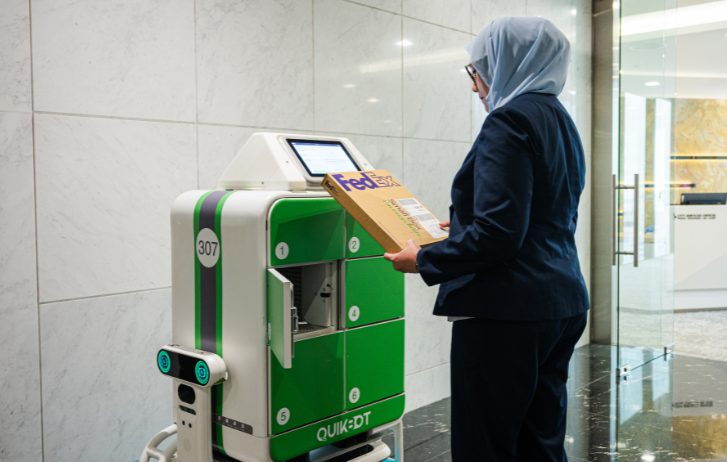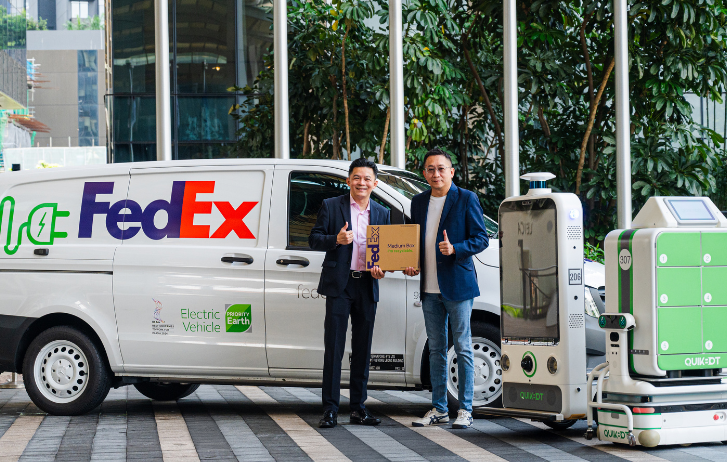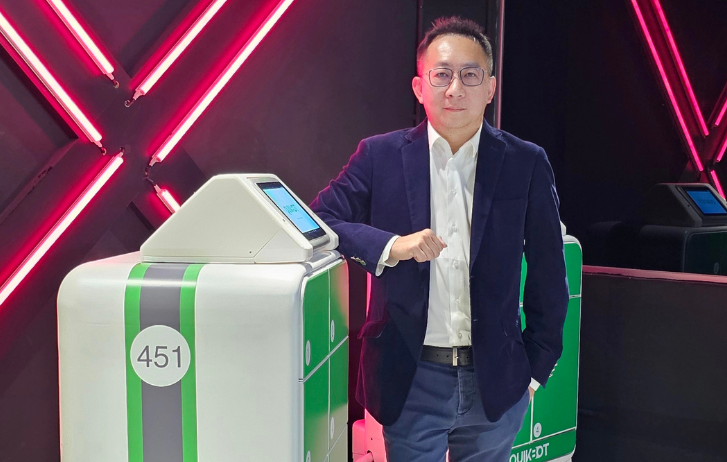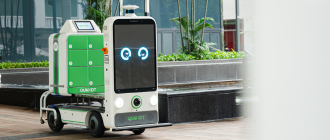
What’s Next For Final-Mile Delivery Platforms? QuikBot CEO Alan Ng On Smart City Logistics
By FedEx | July 11, 2025
As cities grow smarter and more connected, the challenge of delivering goods quickly and reliably remains. Alan Ng, founder and CEO of QuikBot Technologies, reveals how their innovative final-mile delivery platform is reshaping smart city logistics by blending agentic AI with human-centric service.
- QuikBot is a Singapore-based start-up building a smart, scalable final-mile delivery platform, using robotics and AI to transform smart city logistics.
- Since 2021, QuikBot has expanded to Japan and the UAE, achieving 30% faster deliveries and 20% lower emissions.
- Founder and CEO Alan Ng discusses challenges, localization, and future trends in delivery automation technology.
In today’s world of instant everything, getting packages to people faster and smarter is a growing challenge for cities around the world. From Singapore’s high-rise office clusters to the sprawling business and innovation hubs of Tokyo, final-mile delivery is being reimagined – and one start-up is leading the way.
QuikBot Technologies, founded by seasoned entrepreneur Alan Ng, is not just building robots. It’s building the infrastructure for a new era of final-mile delivery platforms. At the 2025 Asia Tech x Singapore Enterprise Tech Awards, QuikBot was named Best Startup of the Year, a recognition of its powerful autonomous delivery platform that’s already changing how goods move in some of the world’s most advanced and busiest cities.
QuikBot’s approach integrates agentic AI, robotics, smart buildings, and cloud-based orchestration into one seamless service. The result? A modular, scalable, and human-friendly delivery automation technology that makes cities smarter and logistics greener.
We spoke with QuikBot’s CEO and founder Alan Ng to learn how his start-up is redefining smart city logistics, what makes AI logistics solutions work at scale, and how autonomous delivery robots work in complex urban environments.
How did you end up starting QuikBot?
Alan Ng: Entrepreneurship is in my DNA. I started my first business at 17, inspired by my father’s values of independence and resilience. I eventually took over the family business in Singapore and scaled it to 14 cities globally, building each operation from the ground up.
Over the past 27 years, I have built and invested in multiple ventures across the region. However, it was during the pandemic, when final-mile logistics reached a critical inflection point, that I saw the opportunity to reimagine the system. This led to the creation of QuikBot.
We believe automation should elevate the service experience by making it more consistent, intuitive, and trustworthy.
There’s a growing number of start-ups across Asia Pacific specializing in autonomous robot delivery. What sets QuikBot apart from other companies in the industry?
While most companies focus solely on building robots, we’ve developed the world’s first agentic AI-powered, interoperable final-mile delivery robotics platform designed for smart city logistics.
Our end-to-end autonomous delivery platform integrates AI delivery robots with elevators, access systems, and smart buildings to enable door-to-door delivery across interconnected urban clusters.
By owning and operating the entire robotics layer, we deliver scalable automation technology with flexible access models, including outcome-based PaaS and enterprise subscriptions. Unlike others, logistics providers pay based on delivery volume and performance, not upfront CapEx.
Our vision is to be the trusted infrastructure partner for autonomous urban logistics. We help cities and logistics providers grow without having to develop their own autonomous systems – powering the future of how autonomous delivery robots work in complex city environments.
What challenges did you face in applying agentic AI to final-mile logistics?
Traditional robotics is rule-based and static. QuikBot uses agentic AI, embodied intelligence, and swarm coordination to enable real-time decision-making in complex environments. Our proprietary Model Context Protocol (MCP) allows robots to perceive, plan, and act autonomously, while our Robotics Middleware Framework (RMF) ensures seamless interoperability across delivery robots, smart buildings, and cloud-based AI systems.
One of our biggest challenges was integrating with fragmented, outdated urban infrastructure. By using modular and open architecture, we transformed disconnected systems into intelligent and adaptive logistics-ready assets, enabling a scalable autonomous delivery platform fit for smart city logistics.
How has QuikBot grown since its launch in 2021?
Since 2021, QuikBot has moved from development to commercial traction. In Singapore, we have partnered with FedEx and other companies.
Our technology is deployed at South Beach and Mapletree Business City, with upcoming rollouts across Raffles Place, One-North, and the Punggol Digital District, forming a city-scale smart city logistics network.
We’re also scaling internationally across Japan, South Korea, the UAE, Saudi Arabia, Europe and the US, while deepening our reach in healthcare, hospitality, and institutional logistics.
Our platform has demonstrated up to 30% faster delivery and 20% lower emissions. Our enterprise pipeline exceeds S$5 million, with revenue growth projected to accelerate in 2026.
How does QuikBot’s revenue model support sustainable growth?
We operate two revenue models:
- PaaS (Platform-as-a-Service): A pay-per-delivery model that helps logistics providers scale city-wide without upfront CapEx.
- Enterprise services: A subscription model for institutions covering internal, autonomous delivery.
This dual approach captures both high-volume urban logistics and stable recurring revenue, setting the stage for scalable growth from 2026.
What key trends will shape the future of last-mile delivery?
The future of final-mile delivery platforms will be shaped by several key trends:
- The rise of agentic AI and embodied intelligence for real-time, autonomous decision-making, enhancing how autonomous delivery robots work
- Development of interoperable smart infrastructure that transforms buildings into logistics hubs, advancing smart city logistics
- Adoption of outcome-based, service-as-a-platform models that lower capital barriers and drive scalable delivery automation technology
- Integration of ESG-linked logistics tying operational performance to emissions reduction
- Expansion of scalable urban delivery networks powered by Robotics Middleware Framework (RMF) and swarm collaboration, strengthening comprehensive autonomous delivery platforms
Together, these trends will accelerate smarter, more efficient, and sustainable AI logistics solutions for urban mobility.
What’s one belief you hold that others in the industry might not share?
We believe automation should elevate the service experience by making it more consistent, intuitive, and trustworthy. While others may focus purely on efficiency and cost savings, we prioritize creating interactions that feel reliable and human-centric.
At QuikBot, our agentic AI is designed to navigate real-world environments in real time and integrate seamlessly with building systems. Every delivery is designed to be precise and respectful of the human context. This philosophy reflects the spirit of FedEx’s Purple Promise, where every customer experience matters.
What is your greatest business failure that you treasure the most?
Early in my career, I expanded a retail venture into China without fully understanding local regulations, partner dynamics, and operational complexity. The venture failed quickly, but it became one of the most valuable lessons I’ve ever had.
That experience taught me that true scalability requires deep localization. It requires aligning with local infrastructure, meeting compliance standards, respecting cultural expectations, and earning stakeholder trust.
At QuikBot, that principle guides every deployment – in cities like Tokyo, Fukuoka, and Dubai. This approach has shaped our strategy and leadership style, ensuring each solution is grounded, relevant, and built to last.
***
In our Confessions of a CEO series, Asia’s leading entrepreneurs offer real-world lessons and inspiration for small businesses across the region. For more stories from these top leaders, subscribe to our monthly newsletter.
SHARE THIS STORY
- 85% Of APAC Businesses Plan To Expand Into Europe, According To New FedEx Report
- Generative AI: A New Frontier
- How To Ship A Giant Panda
- The Rise Of Intra-Asia Trade: Opportunities In The China-Southeast Asia Corridor
- Where Do Old Planes Go When They Retire?
- What’s So Dangerous About Coconuts? Your Guide To Dangerous Goods Logistics
Sign up now and save on your shipping rates!
Sign up now and earn discounts by shipping instantly with FedEx Ship ManagerTM at fedex.com.
Recommended For You

Are Autonomous Robots Powering Asia’s Production Economy? Botsync’s CEO On Mass Automation
Rahul Nambiar, CEO of Asia’s leading robotic automation provider, chats through plans for automating factories and warehouses with robotics tech.
Read More
Why Last-Mile Delivery Is Critical For Supply Chains In APAC
Learn how innovative last-mile delivery solutions reduce delays, improve customer satisfaction, and fuel business growth amid APAC’s e-commerce boom.
Read More
How Reza Behnam Provides Tech Startups With Strategies For Success
Digital Direction CEO Reza Behnam provides mentorship, playbooks and funding for tech entrepreneurs looking to make it big in Singapore and beyond.
Read More